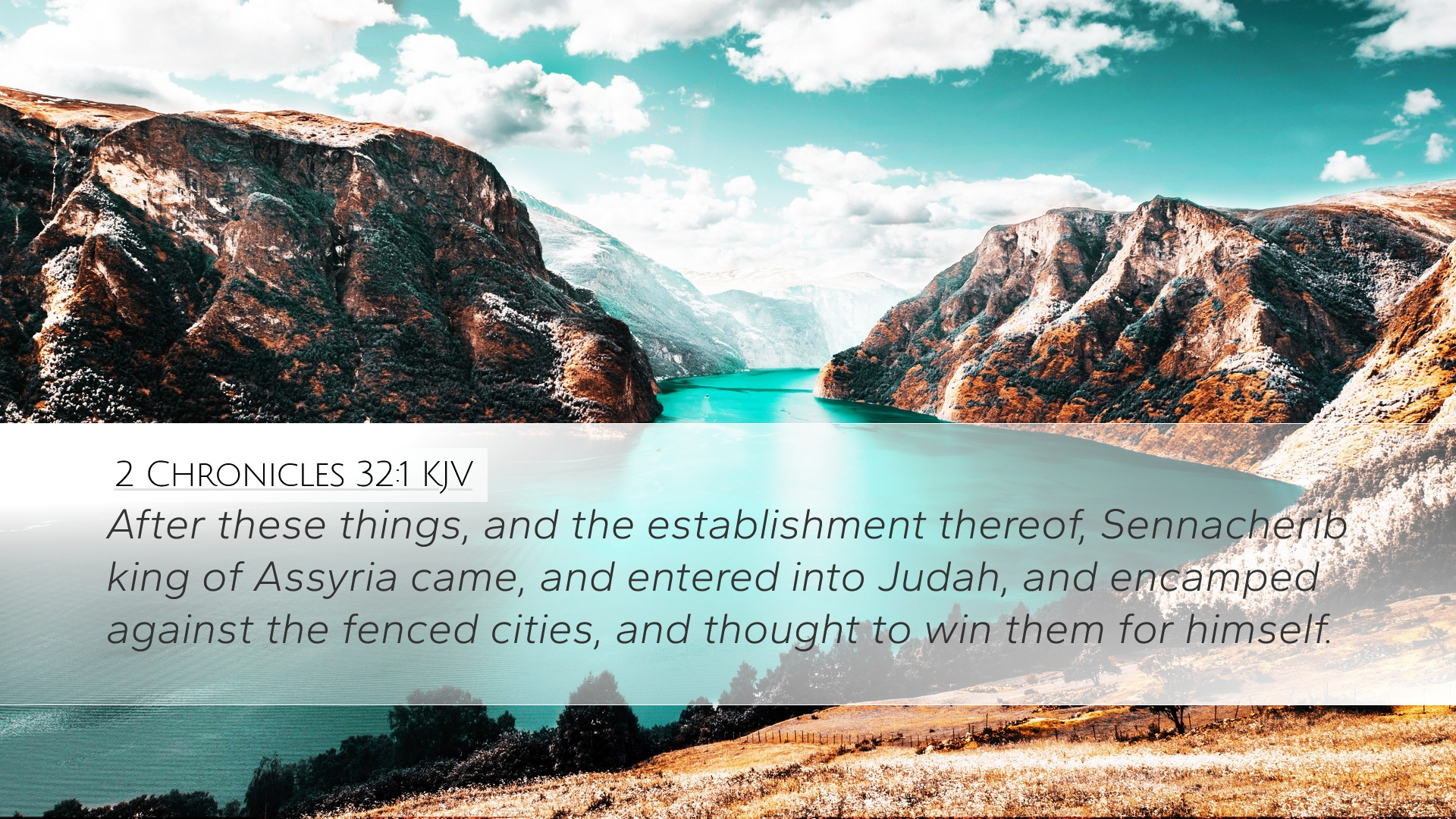Commentary on 2 Chronicles 32:1
Verse Context: 2 Chronicles 32:1 states, "After these deeds of faithfulness, Sennacherib king of Assyria came and entered Judah, and encamped against the fortified cities, thinking to win them over to himself." This verse sets the stage for a significant confrontation between the faithfulness of Hezekiah and the aggressiveness of Sennacherib, illustrating the broader theme of conflict between divine righteousness and earthly powers.
Overview of the Commentary
This commentary seeks to provide insights into the implications of this verse by examining various themes such as the faithfulness of Hezekiah, the threat presented by Sennacherib, and the broader context of God’s sovereignty in the affairs of nations. Insights will be drawn from public domain commentaries, primarily Matthew Henry, Albert Barnes, and Adam Clarke.
Faithfulness of Hezekiah
Hezekiah's reign exemplifies fidelity to God amid trials and tribulations. As noted by Matthew Henry, Hezekiah undertook significant reforms aimed at restoring true worship in Judah, including the removal of high places and the reestablishment of the Passover (2 Chronicles 30). His faithfulness is foundational to understanding the confrontation with Sennacherib.
Albert Barnes emphasizes that the "deeds of faithfulness" refer to Hezekiah’s efforts in reliance on God, showcasing his leadership in restoring the covenant relationship with Yahweh. This faithfulness likely serves as the backdrop against which the Assyrian invasion is interpreted, illustrating the tension between God's promises and the world's opposition.
The Threat of Sennacherib
Sennacherib, the king of Assyria, represents a formidable enemy to Judah and symbolizes the threat of worldly powers that aim to undermine the people of God. Adam Clarke notes that Sennacherib's strategy involved not just military might but psychological warfare, seeking to demoralize the inhabitants of Judah before engaging them directly. This threat is emblematic of the challenges faced by believers today, where external pressures can create an atmosphere of fear and doubt.
Furthermore, Henry highlights the Assyrian king's previous successes in dismantling surrounding nations, which could serve to amplify the sense of impending doom among the Israelites. It is essential to recognize that the physical threat from Assyria is paired with a spiritual challenge: whether the people will rely on God in the face of overwhelming odds.
The Sovereignty of God
The overarching theme in 2 Chronicles 32:1 is the sovereignty of God, who allows such adversities to test and refine His people. Hezekiah’s faithfulness and Sennacherib’s aggression both serve His purposes. Barnes advises believers to view challenges as opportunities for God to manifest His power and faithfulness.
Henry notes that divine intervention becomes more poignant in adversity; thus, the narrative progresses into the descriptions of how God ultimately delivers Hezekiah and Judah from Sennacherib’s hand. The divine response in subsequent verses illustrates God’s authority over political realms and His care for those who honor Him.
Lessons for Today’s Believers
- Faith in Adversity: The faithful response of Hezekiah encourages modern believers to trust in God during challenging times.
- God’s Deliverance: Just as Hezekiah sought God, believers are reminded to lean on divine strength when facing their Sennacheribs.
- Historical Context: Understanding the historical backdrop of Israel’s struggles offers insights into the political and spiritual battles that are still relevant today.
- Call to Prayer: The narrative encourages a life of prayer and dependence on God in all situations, inviting believers to bring their fears before Him.
Conclusion
In summary, 2 Chronicles 32:1 serves as a profound reminder of the intersection between human faithfulness and divine sovereignty in the face of overwhelming challenges. The insights from Henry, Barnes, and Clarke guide us to understand that, while the threats from the world may seem insurmountable, God remains in ultimate control and is a refuge for His people. Therefore, the journey of faith requires steadfastness, with the promise that reliance on God yields divine protection and deliverance.


